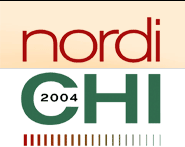|
|
Interaction and innovation
Themes
NordiCHI is the main Nordic forum for human-computer interaction
research. NordiCHI is the meeting place for researchers from academia
and industry, designers, practitioners, educators and others from a broad
range of traditions and communities; therefore the conference takes HCI
in the non-limited sense of research and practice addressing the design
and use of interactive technology.
NordiCHI is biannual. The conference is a joint effort supported
by the
Nordic HCI organisations as well as international partners. The first
conference, NordiCHI 2000, was organised by STIMDI, and took place in
Stockholm, Sweden, October 2000. NordiCHI 2002 was hosted by Centre for
Human-Machine Interaction, University of Aarhus, Denmark, in cooperation
with SIGCHI.dk. NordiCHI 2004 is hosted by University of Tampere, Finland,
in cooperation with SIGCHI Finland.
The backbone of the conference is the technical programme
in which a limited number of refereed papers, meeting international standards,
will be accepted. NordiCHI 2004 also invites good quality short papers
to generate and sustain interactive cooperation among the conference participants,
and to stimulate dissemination of late-breaking results.
Traditionally, Nordic perspectives on HCI emphasise topics
such as: technology in use, integration of design and use, exploratory
design activities, and inter-disciplinary approaches to HCI. This tradition
originates in the Nordic openness to new approaches and divergent ideas
in the development of new concepts and practices for the future. NordiCHI
is the meeting place for tradition and new directions.
Conference topics include but are not
limited to:
- Co-operative design, design cases, and innovation
- Information technology in everyday life
- New interaction techniques and devices
- Models of interaction
- Information visualisation
- Ubiquitous, pervasive, and mobile interaction
- Artistic and aesthetic approaches to HCI
- Cooperative activities mediated by technology
- Studies of work and technology
- User-centered design
- Accessibility
- Interfaces supporting learning
|



